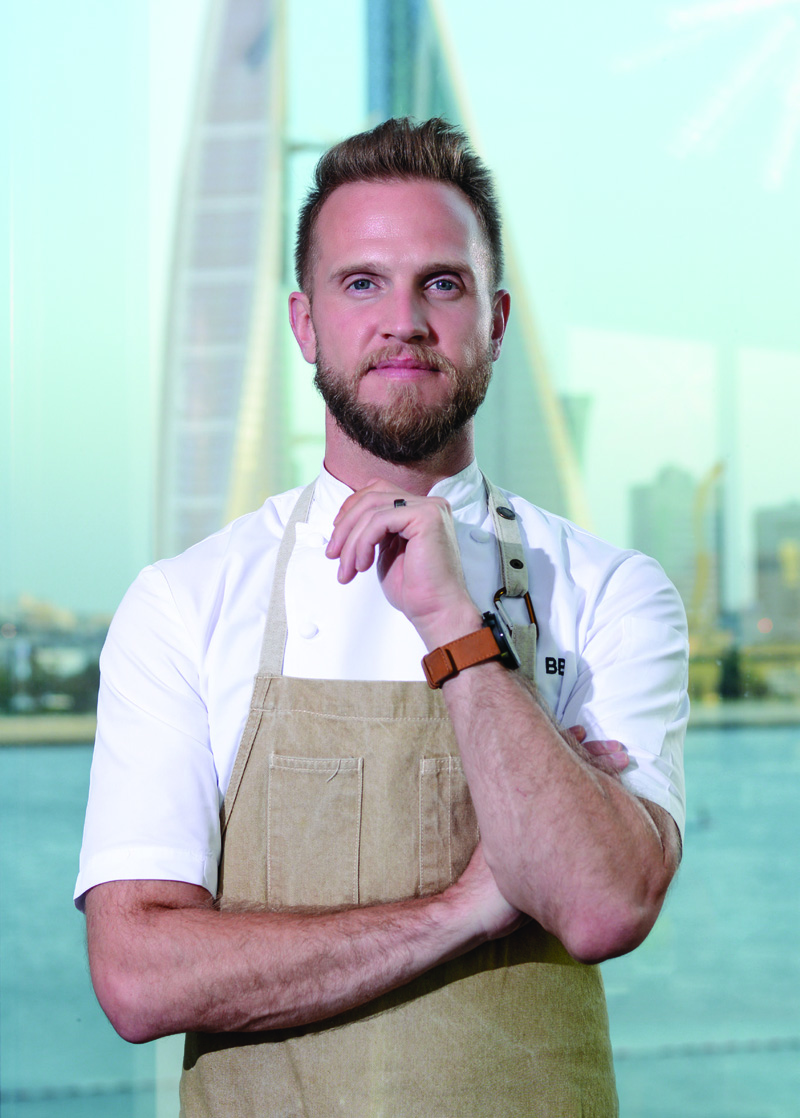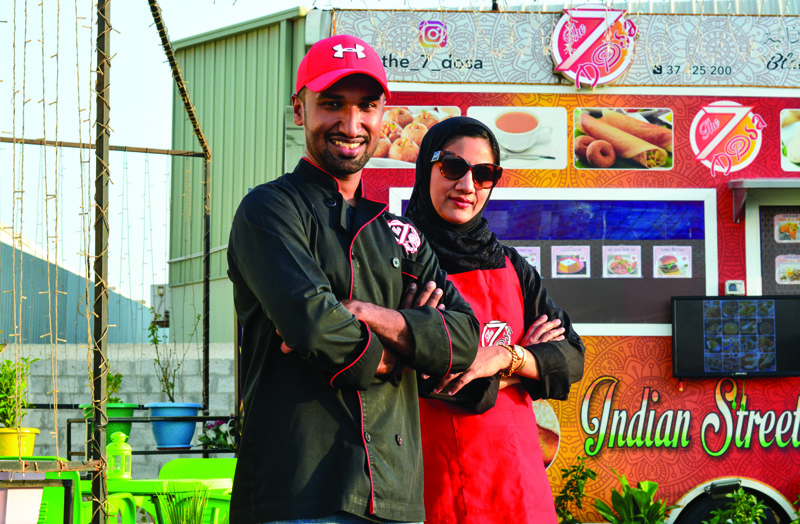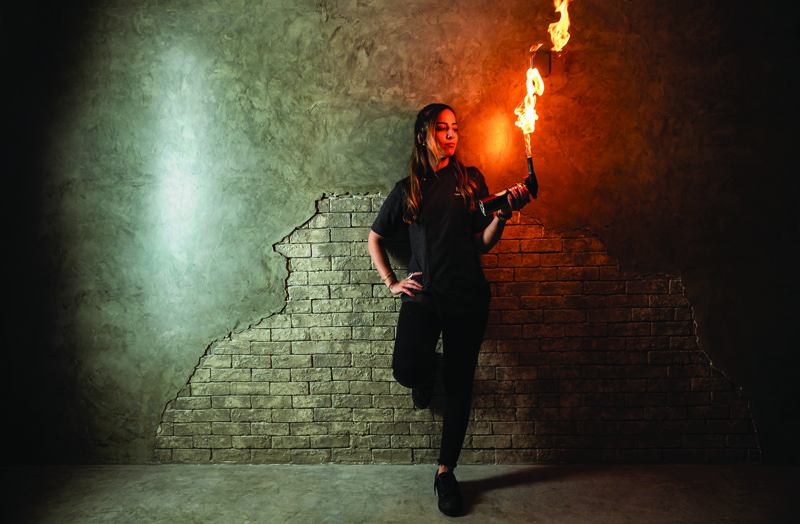From Them, with Love

Nothing satiates Fact Bahrain more than the culinary diversity of our island, as illustrated by our upcoming Fact Dining Awards. After all, restaurant tables are where people gather to grieve, honour, celebrate, and bond – they’re a proverbial revolving door of palates and preferences. But what about the wonderful personalities behind these flavours from far-flung places? Here’s a peek.
A merica’s culinary inventions have essentially conquered the world – you can find a McDonald’s outlet in just about every nook and cranny on the planet. But anyone who has experienced the joys of soul food knows there’s so much more to American palates than burgers and hot dogs. A style of cuisine generally associated with the southern states, it’s about more than fuelling the body. Soul food brings together African Americans from far and wide over a common cultural narrative, a common racial identity. “Soul food is food that brings comfort,” says private chef Markeeta Hardin, who hails from Tennessee. “It’s food that everyone loves to eat, but not everyone knows how to create. There’s a good mix of meats, fried and smothered in gravy.
There’s also lots of vegetables, but the most popular is collard or turnip greens. You must have baked macaroni and cheese and, of course, cornbread.” But the key ingredient? “The only way to prepare soul food is with love – nothing more, nothing less.” While Markeeta is known by many for her role in the US Navy, she is loved for bringing a taste of her hometown to Bahrain – like the other chefs you’ll meet in the pages ahead. “I was fortunate to share my love of soul food by hosting my very own Soul Food Brunch at one of the oldest restaurants in Manama, Upstairs Downstairs. Friday brunches are extremely popular in the region, so to have the opportunity to share my style of cooking and serve a variety of southern favourites was extremely special. I was ecstatic over the support I received from a diverse group of people.” Unsurprisingly, the diversity of Bahrain has influenced her as a chef. “It excites me when I adopt the culinary traditions of other cultures – whether it’s cooking with a new spice or creating a local dish.

I’ll create a local favourite, but adjust the recipe to make it my own.” Here, our talk turns to how Markeeta’s relationship with food evolved over the course of this complicated year, and we quickly see that the famous ‘Southern hospitality’ is alive and well. “The joy that food brings to others still makes me happy. Although I loved hosting the brunches, I equally love teaching virtual cooking classes and preparing meals for locals who suffered financially during this pandemic. That makes my heart full.” Reflecting on how her childhood shaped her, she says, “My mom cooked when I was a child, but she played it safe, always making the same dishes. My father never made the same thing twice, though. He would just throw ingredients and spices together – he’d create food. I adopted that attitude and skill extremely early in life, so growing up, I’d create all these crazy dishes for my sisters when my mom would leave for work. It became a passion.” What a refreshing revelation!
Time after time, we meet chefs who credit their mothers for their love of cooking. This is a first, and we love it. ✤
One takeaway after a chat with the famed chef Brian Becher? Don’t be nervous if you invite him over for dinner. “People have a misconception that I’m judgemental about food, but there’s only two types of cooking: good cooking and bad cooking. As long as the food tastes good, nothing else matters. In fact, here in Bahrain, only one of the six or seven restaurants I frequent is fine dining.” The Executive Chef of CUT by Wolfgang Puck may be the talent behind a menu that charges BD12.5 for a Philly cheesesteak, but in his free time, he’s a regular at the likes of Badawi and Pho. Like Will Smith’s most famous character, Brian hails from West Philadelphia, so it’s hardly a coincidence that he has singlehandedly elevated the Philly cheesesteak, a culinary icon of his hometown.
“The cheesesteak we serve is pretty far from traditional,” he explains. “It’s my vision of what a cheesesteak should be, with consideration to what the locals like. In Philadelphia, people would want the bread a bit firmer, and several cheese options. Part of the reason I wanted to serve cheesesteaks is that it’s an opportunity for me to share the food of my childhood with the friends I have made.” He explains why a big part of Philadelphia’s dining scene is a kind of bastardised Italian background, as he describes it. “From the 1910s to 1930s, you had a big amount of people moving from Southern Italy to New York and Pennsylvania, and that heavily influenced the south of Philadelphia, where both of my parents are from. An interesting thing here: growing up, what I was told was Italian food has very little to do with what is served in Italy – I only learned that when I got older.”

Brian’s mother is a terrible cook – his words, not ours, we promise. “She’ll tell you the talent skipped a generation because my maternal grandmother was a phenomenal cook,” he says with a laugh. “My mother’s parents are from Southern Italy, so Italian food influenced me greatly because I still have a deep affinity for pasta. I love simple things like flour and water. I love the idea of creating something by hand that will go on to nourish someone I’ve never met. That’s an intimate connection.” Brian recently overhauled the menu at CUT by Wolfgang Puck, and peeking through all those prime cuts of meat is his Italian heritage.
“We created a whole pasta section because it’s something I’m passionate about. There’s one dish in particular, a farfalle pasta with preserved lemon, butter, Parmigiano-Reggiano, and poppy seeds – it’s an elevated take on pasta with butter. I’m serving the adult version of what made me happy as a kid.”
Life in Bahrain has certainly infused Brian with a ‘find local’ mindset. “When we opened, we were primarily using things like Dover sole and salmon, and then it dawned on me: we’re on an island. Hammour is maybe the tenth best fish around? Between shari, sikken, and rabeeb, there’s so many better ones,” he says. It’s this mindset that only amplified as a result of the pandemic. “I became more focused on finding local ingredients because, in Bahrain, a lot of things come from outside – and that became really restricted around March/April.” The unprecedented circumstances also made for an experience he never saw coming. “Delivering a cheesesteak in a Rolls-Royce – talk about a bucket list item!” ✤
S peaking of Italy: the name Susy Massetti needs no introduction – whether you view food as fuel or pleasure. The beloved Italian chef is responsible for some of your favourite culinary haunts – Fishbone and Masso included. Oh, and not that we have a crystal ball or anything, but it’s only a matter of time until L’Orto is added to that list. Susy’s latest venture is inspired by her love for gardening, making it an apt name for the new restaurant – l’orto in Italian translates to ‘vegetable garden’.
Admittedly, it came as a surprise to us that Susy attributes Bahrain for being able to pursue her dream of organic farming. “Moving to Bahrain has definitely influenced who I am as a chef,” she says. “For the first time in my career, I felt ’embraced’ not only for bringing good food – which is my job, after all – but also because customers here understand my wholesome approach. I believe true hospitality ‘restores’ people, so I serve food using so much more than just ingredients. It also contains care, time, and a sincere effort to nourish the soul as much as the body. This has pushed me to go beyond the work in the kitchen and chase my dream of becoming an organic farmer in the pursuit of healthier, more sustainable products – and give back to this country that has given me so much.”

We discuss the culinary diversity of Bahrain with Susy, who has been instrumental in bringing quality Italian food to the island. “Indeed, I believe I brought the flavours of my Milano, the flavours I grew up with, the flavours I absorbed through my mother and grandmother’s cooking to Bahrain. I strive to take my guests on a journey of authentic flavours rooted in the history and culture of my home country – to tell them my story through food.” Respect, she says, is key. “My childhood taught me the importance of good ingredients, but foremost, to respect good ingredients and therefore respect the people I am cooking for.
I can almost remember the first time I ever made anything and, since that day, there’s a collection full of flavours, smells, noises, and colours that I happily carry with me everywhere I go!” So how did 2020 contribute to that collection? “If possible, my relationship with food improved. I have never been a baker as patience is not my forte, but I’m now in love with baking. 2020 has given me the time I needed to regroup, considering all my ongoing projects. I’ve been able to revisit and share many of my recipes and, of course, develop new ones.” Susy is also optimistic about our new normal. “What I noticed most is a desire to truly understand what food does to you. Not only did the pandemic get more people interested in cooking, but they also seem to share both food and recipes more than before. Perhaps social distancing made us realise how distanced we were before, despite all that technology designed to connect us?” ✤
We spent over an hour talking herbs and spices with the talented chef Goh Boonwah – if that’s any indication of how charismatic he is. Known for his epic, impeccably plated Japanese creations at the achingly trendy Bushido, he’s a native of Malaysia, a piece of this puzzle that has us instantly hooked. Malaysian cuisine (like the people of Malaysia) is culturally diverse, drawing inspiration from the likes of Indian, Indonesia, Chinese, and Thai food. It’s no wonder that the brunches at Bushido, during which Goh’s heritage really shines, are incredibly popular. “Brunch is when I’m able to play,” he says. “I get to serve laksa, nasi lemak, satay, mee goreng, and prawn noodles. You’ll never be bored of our brunches because we’re always changing it up.” Together, we go back in time, discussing how spices first made their way to Malaysia. “We didn’t have them until they came from India, especially via Malacca, which developed into an important trading port during the 16th century,” says Goh.

“Nowadays, the ingredients and cooking techniques of the same dish could be totally different around the region. For example, the watery sambar in India would differ from the thick sambal in Indonesia. But Malaysia has so many different populations. You can find everything from Chinese chicken rice and wonton noodles to laksa. You won’t just eat curry there – you can try something new every day.” Goh formally trained under Japanese chefs, but like many of the culinary talents we spoke to, his mother played a big role in who he is today. “When I was growing up in the province, my mother wouldn’t just cook Chinese food, she’d cook all types. The area was dominated by Malays, which influenced her. But what made her food so special is that she cooked from the heart. She knew I didn’t like tomatoes, carrots, and sour foods, so she’d adapt traditional dishes according to my preferences. That’s when I first had an opinion about dishes.” The chef’s passion for food saw him shadow his mother from a young age. “I’d always be beside her when she was cooking because I love to eat. You don’t ever forget the taste of your mum’s food, right,” says Goh, taking us on a trip down memory lane.
“You grow up craving those dishes, but no restaurant can ever compare to the taste of her cooking. It’s because she made it with love.” Goh tells us of the day his mother stepped into Bushido for the very first time, an endearing anecdote we’ll remember long after. “I brought her to the restaurant during one of the brunches, so the place was packed. She was awestruck by the size, the atmosphere. But she never once asked me about my position – all she knew was that I’m a chef. She was shocked to hear I’m the Chef de Cuisine. It was such a proud moment.” One chat with Goh, and it’s clear where his relentless work ethic comes from – a challenging childhood. “I was seven and my youngest brother was only five months old when my father passed away. How was my mother supposed to work? But she is so strong. I remember she’d wake up at four, five in the morning to start making desserts, which I would then sell. I’d walk around with baskets of food, going from here to there. I was still a kid at the time – all I wanted to do was play. But this is why food is very much a part of me, of who I am. It’s in my DNA.” ✤
And on the subjects of spices, let’s turn our attention to the one cuisine with universal appeal: Indian. But it’s not the chef of an Indian restaurant we spoke with – it’s Hasan Al Majed and his wife Shabnam, who own and operate The 7 Dosa and collectively represent both India and Bahrain. “Our main goal was to bring Indian street food to Bahrain. You can walk down the streets of New Delhi or Mumbai and easily find pav bhaji and vada pav on the road, but there was nothing like that here. It’s a small island, after all,” explains Hasan, delving into how the popular food truck in Tubli came about. Hasan is half-Bahraini and half-Indian, and has fond memories of travelling to Mumbai with his mother as a child. “We took annual trips to India during the 90s, and I loved going out to eat street food. I always found it interesting. My mother also cooked a lot during those days, so the smell of spices all over the house inspired me to try cooking with her. She used to bring her spices from Mumbai, and they had an intoxicating scent – it made the food in our home totally different.
My neighbours would always ask me what my mother was cooking,” he recalls. Shabnam, meanwhile, is from Mumbai and now a citizen of Bahrain. The two have been together for 16 years. Oh, and we’re utterly taken by the role of food in their love story. “When Shabnam and I started dating, I was shocked because she’d bring food from home when we met outside,” says Hasan. “I’d tell her we’re going out to eat, but she insisted that she enjoyed cooking. She loves her time in the kitchen.” Shabnam tells us that she and her siblings would always return home from school to a hot meal. “My mother was known for her kutta hua gosht (meat minced with spices) and machli ka salan (fish curry).

I still have vivid memories of these dishes.” Today, the two bring together the most popular street food dishes from across India to Bahrain – idli, masala dosa, and medu vada included. “Our customers always tell us how much they love our vada pav. One customer, who hails from India and hasn’t been able to fly back for nine years, says our food brings back memories of home,” shares Shabnam. Not only does The 7 Dosa boast a royal seal of approval – HH Sheikh Khalifa bin Salman Al Khalifa paid a visit soon after its opening – but customers here range from Australian to Pakistani, British to Chinese.
Like the harmony in their marriage, the street food at The 7 Dosa sees the mixing of Indian and Bahraini ingredients together. “We pair coriander powder, turmeric, and a homemade Bahraini curry powder with spices like garam masala and chilli powder from India. We also mix Kashmiri saffron with local saffron, which makes for amazing flavour in our saffron milkshakes. We’re always experimenting with different styles of doing the same thing,” explains Hasan. And the proof is in the proverbial pudding – The 7 Dosa launched with 29 menu items in November 2019. Today, there’s 101 things to choose from. So is opening a restaurant the next step? “We studied the idea for a few months, but then coronavirus happened, so we had to take a step back.” Not ones to be discouraged, they started home delivery after countless customers called with the same request. “We learned a lot during this period because we kept creating and experimenting,” he tells us. “We almost forgot about the pandemic outside.” ✤
A little mystery never hurt anyone – especially if said mystery is behind the best, most authentic tacos in the country. Chef Brito, who prefers to maintain an air of anonymity, is the talent behind Comalito – or the best thing about Mondays, as some know it. The Juffair-based food truck makes an appearance only once a week, but behind it is a story we fell in love with. “A comal is the flat iron pan on which tortillas are cooked, so the name Comalito comes from a ‘toy’ I was given by my grandma when I was a child as she would have to babysit me while cooking. She kept me in the kitchen because she wanted to keep an eye on me, so to avoid any accidents, she gave me a toy – honestly I think it was just a plastic plate,” she says with a laugh. “She would tell me to make tortillas on my comalito, so there I was ‘cooking’ on a plastic plate.”
To say the pop-up is a labour of love is an understatement – a place for Tex-Mex, it isn’t. “Comalito is an homage to my grandma and my beautiful childhood memories in Acapulco, Mexico. The tacos I make are the same ones my grandma used to make when I was growing up. Her cooking always brought me comfort. The memories I have of her roasting chillies to make delicious salsas and even burning my fingers while turning the tortillas over – it was hard work, but it was all worth it as the tacos were delicious. I could see how happy she was when the whole family was fed and satisfied.” Brito says she wanted to share a piece of that comfort with people at affordable prices in a place so far from home. “Once you bite into the taco, at least for that moment, you will be transported back to Mexico.”

Her grandmother’s wisdom made for a full-circle moment earlier this year, a time when the pandemic changed life as we knew it overnight. “She taught me to respect the ingredients and the hard work that goes behind everything in the process, from the farmers harvesting the corn and chillies to the people transporting the ingredients to us. She taught me to be proud of our heritage and honour it while cooking. Today, most of our ingredients are shipped directly from Mexico, and I now understand what she was trying to teach me about respect. I have learned to treasure the ingredients even more after finding different ways to get them here, so the food quality wouldn’t be affected by this situation.” At Comalito, Brito personally makes the masa – a combination of corn flour and water – from scratch, and all the tortillas are pressed by hand and cooked individually.
“I’d never handpressed so many tortillas in my life until I started the popup!” And living in Bahrain has certainly honed her culinary skills. “I found myself longing for the taste of those tacos ever since I left Mexico. What they have here in Bahrain is not even close to the tacos I grew up with, so I started cooking and importing ingredients. I became more resourceful as a lot of the ingredients I need for the tacos cannot be found locally, from the tortilla presses to the organic corn flour. It makes me appreciate every single tortilla and ounce of salsa due to the hard work it takes to make them.” ✤
But no conversation about all these chefs serving up a taste of their hometowns would be complete without examining the reverse – the island’s sizable expat community broadening its culinary horizons by discovering Bahraini cuisine, both traditional and contemporary. One name synonymous with the latter? Chef Tala Bashmi. The poster child for playing with food, she became a household name after starring on Top Chef Middle East. But Tala is so much more than a finalist in a cooking competition.
She’s the head chef of Fusions By Tala, a dynamic eatery where everything you eat boasts her touch – the ingredients are handpicked by Tala from local markets and vary depending on the season. We can’t help but ask her thoughts on how ‘fusion’ is sometimes known as the ‘f-word’ in the world of dining, often getting a bad rep for simultaneously corrupting two different cuisines. “Fusion, confusion – there’s definitely a fine line there,” she admits. “I think it’s all about how it’s interpreted. The goal isn’t to try to be as crazy as possible. The magic happens when we find the delicate balance between flavours and techniques.” Creative and resourceful, Tala tells us about how her childhood impacted her approach to food. “I grew up going to local markets, so seasonality – especially when it comes to seafood – as well as the locality of produce is really important to me.

Though our resources are limited, especially during the summer, I believe it takes a better chef to create something with very little. It’s easy to create a great dish with some of the world’s most expensive ingredients, but to create a dish at that level using humble ingredients? That takes skill.” And it’s a skill she possesses in spades, challenging misconceptions about local cuisine by reinventing it. “Bahraini food is often perceived purely as sharing comfort food – large portions, riceheavy, really rich. This is because jobs in the past tended to be labour-intensive, so this one meal had to be rich in order to keep people full all day. I’m now trying to capture the essence and flavours of our cuisine while transforming it into a lighter, more elevated version.” Tala is not one to shy away from taking risks, experimenting with flavours from the world over. “Roughly 50 percent of Bahrain’s population is made up of expats, so exposure to a variety of cuisines helped me understand so many new textures and techniques. As a result, my food isn’t purely Bahraini, but based on everything I grew up eating.” She does, however, have an affinity with Scandinavian cuisine. “Their seasons are just as extreme as ours,” she explains.
“They use fermentation to preserve produce for the winter – when hardly anything grows – so I’ve adapted that in order to preserve our ingredients when the scorching summer comes along. Fermentation is found in most of their dishes and, to me, allows chefs to create new and nonexistent flavours.” As for experiments gone awry? “I recently tried to recreate a unique gnocchi recipe from Spanish restaurant, Mirazur. Unlike the traditional recipe, this one uses potato starch. When I made it, the texture was so slimy and off-putting – I won’t say what it resembled, but let’s just say it scared me a little,” she says without a hint of irony. Tala continues to take this unusual time to further develop her craft, hoping to infuse the year with some redeeming qualities. “Because the experience is an important element of my food philosophy, I’ve been focusing on creating more fun and mentally stimulating experiences. I want to bring some magic back into 2020 – the good kind.” ✤





























